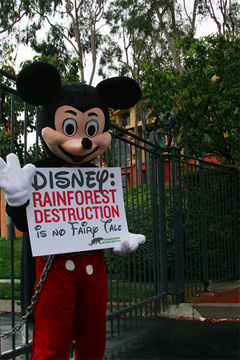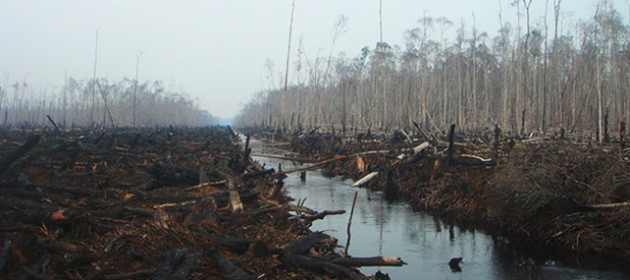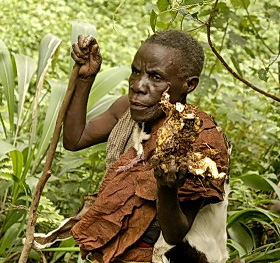

Companies Making a Difference ~ Disney drops paper suppliers linked to deforestation
Disney this week announced sweeping changes to its paper-sourcing policy that will exclude fiber produced via the destruction of tropical rainforests.
The policy comes in response to a campaign by the Rainforest Action Network, an environmental activist group that had targeted Disney for its failure to exclude paper produced by two controversial Indonesian suppliers: Asia Pulp and Paper (APP) and Asia Pacific Resources International Holdings (APRIL). The paper giants have been linked with destruction of key wildlife habitat on the Indonesian island of Sumatra as well as conflict with local communities. Sumatra lost more than half its natural forest cover since 1985.
The new policy has two phases. The first focuses on paper sourced directly by Disney, which is the largest publisher of children’s books and magazines. The second addresses paper sourced by Disney’s independent licensees.

RAN protest against Disney in 2010. Photo: Margery Epstein
The policy aims to minimize the consumption of paper, including eliminating paper products containing “irresponsibly harvested” fiber like that from wildlife-rich forests, wood from genetically modified tree plantations, and fiber from plantations established after 1994 at the expense of natural forests. Disney says it will maximize recycled content and fiber sourced from companies certified under the Forest Stewardship Council, an eco-standard. Disney will report on its progress on an annual basis.
“The paper policy is an example of how Disney conducts business in an environmentally and socially responsible way, and demonstrates the Company’s commitment to creating a lasting, positive impact on ecosystems and communities worldwide,” said Dr. Beth Stevens, senior vice president, Disney Corporate Citizenship, Environment and Conservation, in a statement.
The policy was immediately welcomed by environmentalists.
“Rainforests are more valuable left standing than being pulped for paper,” said Rebecca Tarbotton, the Executive Director of Rainforest Action Network (RAN), which worked with Disney on the policy. “Disney is adding its voice to the growing chorus of companies demonstrating that there’s no need to sacrifice endangered forests in Indonesia or elsewhere for the paper we use every day.”
“Indonesia has one of the highest rates of deforestation in the world due, in part, to pulp and paper giants like Asia Pulp and Paper and APRIL,” added Lafcadio Cortesi, RAN’s Asia Director. “Disney’s commitment will reduce the demand for paper made at the expense of rainforests while creating incentives for improved forest management and green growth.”
Disney becomes the ninth major publisher to announce rainforest-friendly paper sourcing policies, according to RAN. Scholastic, Hachette, Pearson/Penguin, Candlewick Press, Houghton Mifflin Harcourt, Macmillan, Random House, and Simon & Schuster are the others.
RAN says the move by Disney however is particularly significant due to the scale of its operations.
“The new paper policy will be applied to the Company’s entire global operations and those of its supply chain. The commitment includes Disney’s media networks, theme parks, resorts, cruise ships, and all its product packaging, copy paper and book publishing as well as the 3,700 licensees that use Disney characters. It will also influence the operations of 25,000 factories in more than 100 countries that produce Disney products, including 10,000 in China.”
FB Comments
Share This Article
Leave a Reply
© 2009. All Rights Reserved. Galiwango Film, Created, Written, Directed and Animated by Solomon W. Jagwe | www.sowl.com




















